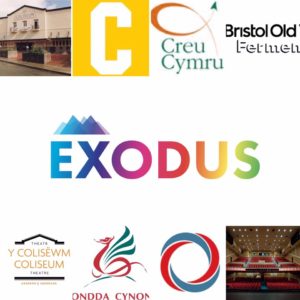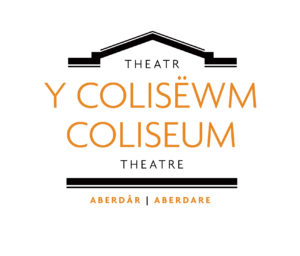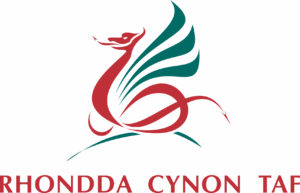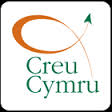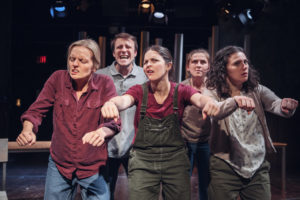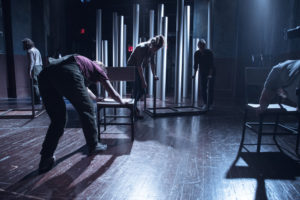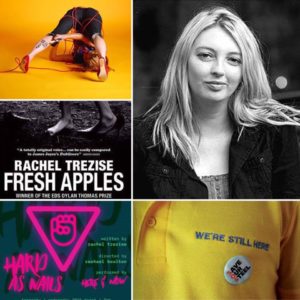
The Director of Get the Chance, Guy O’Donnell recently got the chance to chat to writer Rachel Trezise. We discussed her career to date, theatre in Wales, and access to literature/cultural provision.
Hi Rachel great to meet you, can you give our readers some background information on yourself please?
I’m a writer from the Rhondda valley. I’m most well known for winning the inaugural International Dylan Thomas Prize in 2006 with a collection of short stories about life in South Wales called ‘Fresh Apples.’
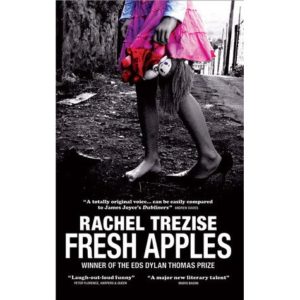
So what got you interested in writing and the arts?
Initially I wanted to be a journalist. I started writing a music fanzine when I was fifteen because I loved music and writing about it so much. Between the time I left school and throughout university I wrote my debut novel in my spare time because I couldn’t wait to start writing for a magazine or newspaper. The novel was published just before I left university and I stuck with writing fiction as well as some freelance journalism.
As a writer you work across a variety of forms from novels, short stories to plays. How do the different disciplines differ for you?
There are different levels of involvement and different amounts of time required to complete each. Short stories are my favourite simply because of their brevity and the fact you needn’t have to hold a whole world in your head which you have to for a novel and to some extent a play. But the writing or the aim of the writing is always the same; to realise each character and their circmstances.
Your first play Tonypandemonium for National Theatre Wales was autobiographical and from a predominantly female perspective. I believe the cast of your next play ‘We’re Still Here’ for NTW is predominantly male and developed from first hand interviews with steelworkers? Can you discuss how this process differs?
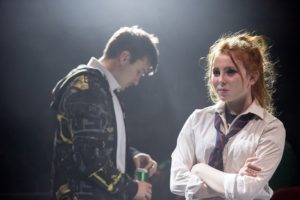
Tonypandemonium National Theatre Wales
Credit Mark Douet
Actually it doesn’t differ. Although Tonypandemonium was autobiographical and We’re Still Here is a form of non-fiction both works come via my own world prism. I’ve worked hard to ensure the steelworkers in the play reflect the people I met and spoke to in Port Talbot but I always try to make sure my characters are authentic to their own locality and situation in any case. What is different I suppose is that the characters in We’re Still Here are predominantly male. But they are working class men working in the rapidly-vanishing realm of heavy industry which, much like the de-industrialised setting in Tonypandemonium is an environment that’s underrepresented in literature and theatre. I’ve tried to make the characters as honest and soul-bearing as the men I interviewed and to completely avoid the more common strong and silent male character trope we see everyday in film and on TV.
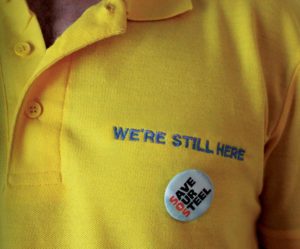
For ‘We’re Still Here’ you are working with Rhiannon White from Commonwealth Theatre. Much of their practice is a socially engaged form of theatre making which has obvious links to NTW’s hugely successful production The Passion with Michael Sheen. Do you feel involving citizen in this way can create new audiences for what can be seen as an elitist art form?

The Creative team on ‘We’re Still Here’ Kully Thiarai, Evie Manning, Rachel Tresize and Rhiannon White
Of course. From start to finish we’ve engaged and will continue to engage with the people of Port Talbot. We’re making a show for the town rather than just about it. In fact Commonwealth Theatre and NTW have set the ticket price lower for residents of Port Talbot which is a very direct way to engage a local and perhaps previously unaccustomed audience and we have a large community cast. NTW worked in a similar way during the run up to Tonypandemonium at the Park and Dare in Treorchy, creating a community cast and inviting the community into rehearsals which gave Treorchy some ownership over the event.
https://www.nationaltheatrewales.org/were-still-here
Get the Chance works to support a diverse range of members of the public to access cultural provision. Are you aware of any barriers to equality and diversity for either Welsh or Wales based artists or specifically writers?
Nothing that isn’t already being identified and addressed but there are always factors that are beyond our control. I loved doing an intensive creative writing workshop with Literature Wales and the South Wales Literature Development Initiative throughout 2013, working mainly with three groups: Young carers, Comprehensive school students and Valleys Kids. All the young people I worked with were eager and receptive but I remember a couple of young people outside one of my Valleys Kids classes who didn’t have the confidence to come in and have a go and whatever I said I couldn’t encourage them because they thought creative writing was somehow academic. I just think it’s a bit of a tragedy that an initiative like that hadn’t reached them a bit earlier in their lives and made the arts seem less threatening.
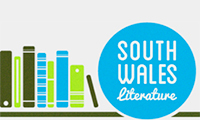
southwalesliterature.co.uk
There are a range of organisations supporting Welsh and Wales based writers, I wonder if you feel the current support network and career opportunities feel ‘healthy’ to you?
Yes, it does feel healthy to me at the moment. My experience, although more with my literature than with drama work, is that it’s been difficult to get work reviewed widely. The literary quarterlies in Wales are always a few months late, the Welsh newspapers aren’t interested in reviewing the arts in any depth and the national media might not necessarily understand the setting of Wales-based work. (I still remember a headline from The Telegraph the day after I won the Dylan Thomas Prize: ‘Rural tales of despair scoop £60,000.’ I wouldn’t in my wildest dreams describe the post industrial south Wales valleys as ‘rural’.) All these issues make getting your work out there difficult but I know that Get the Chance, Wales Arts Review and NTW have been doing a lot of good work in this area.
If you were able to fund an area of the arts in Wales what would this be and why?
Libraries. My life would be very different had I not discovered Treorchy Library whilst my mother was a cleaner there and I’d like to think that every child has a well-stocked library within walking distance where they can access thousands upon thousands of worlds very different to their own.
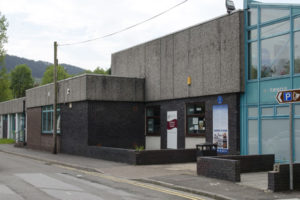
Treorchy Library
What excites you about the arts in Wales? What was the last really great thing that you experienced that you would like to share with our readers?

Work on the script has been manic for the last few months so I haven’t got out much. One thing, which of course it was my duty to see, was an adaptation of one of my own stories ‘Hard As Nails’ by three Treorchy Comprehensive School drama students in association with RCT Theatres and Motherlode. The girls adapted the story, directed and acted in the fifteen minute performance at the Park and Dare and the Millennium Centre. It just made me very proud to have such talented and enthusiastic young people coming straight out of school and diving so fearlessly into the arts.
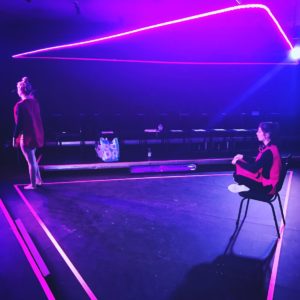
Many thanks for your time

